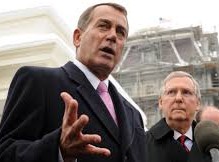In a 60 Minutes interview with Scott Pelley, parts of which aired on Sunday, House speaker John Boehner and Senate majority leader Mitch McConnell made it sound like they are no closer to producing the elusive Obamacare alternative than they were five long years ago.
Pelley made a few introductory remarks about Obamacare and then asked them, “What’s your health plan?”
Boehner proceeded to talk about what’s wrong with Obamacare.
Pelley followed up and asked, “What’s the Republican health care plan?”
Boehner replied, “We’re…we’re working on this, having discussions amongst our members, got a lot of divergent views about how best to go back to a doctor-patient relationship that’s revered, about rewarding medical professionals, as opposed to all those rules that are coming down and frankly driving doctors out of the system.”
Pelley observed, “You know, this is one of the criticisms that a lot of Americans have — that the Republican party knows what it’s against but can’t tell us what it’s for, can’t tell us the details, for example, of a health-care plan after all these years of Obamacare.”
McConnell jumped in and said that Obamacare is a failure. He then added, “If we had the ability to do it, we ought to pull it out root-and-branch and start over. The chances of that happening with Barack Obama of Obamacare in the White House is slim, but we’re gonna make the effort.”
Pelley responded, “You don’t have an alternative.”
Rather than swing for the fences — or even swing the bat — Boehner then concluded that part of the interview by laying down a bunt. He said Republicans would “allow the states to run their own exchanges,” would “allow the American people to buy across state lines,” would “allow small employers to group together so that they can buy health insurance for their employees just like big unions and big businesses can,” and would back “medical malpractice reform.”
Obamacare first started being debated in the first half of 2009. Even before then, it was apparent that the chief problem with the private American health-care system was that the federal government had broken it by putting its foot on the scale through the tax code. That tax code gave lavish tax breaks to employer-based insurance while forcing millions of Americans in the individual market to buy insurance without any tax break. That’s still the case — although the chosen few now have lavish Obamacare subsidies sent to insurance companies on their behalf.
Yet, in 2015, Republican congressional leaders still aren’t focused on fixing that unfairness in the tax code. And that’s even with King v. Burwell on the horizon, with the genuine opportunity it provides to advance a plan that would effectively repeal and replace Obamacare in 36 states and lay the groundwork for full repeal in 2017.
Ed Gillespie ran on an alternative that would address this inequality in the tax code — and therefore fix what the federal government had broken even before Obamacare was passed and made things so much worse — and he exceeded expectations in his Senate race by a wide margin.
Shortly thereafter, he wrote,
“In a purple state like Virginia, I could not have gotten so close to defeating Mark R. Warner, a popular incumbent, by talking only about ‘repeal.’…
“My plan, based on one developed by a public policy group called the 2017 Project, enabled me to rebut the charge that all I wanted to do was go back to things as they were before. Although Obamacare is unpopular, a plan that takes us forward is essential.”
Senator Mike Lee struck a similar chord in Iowa over the weekend, saying,
“The question everyone seems to be asking is whether the men and women thinking about running for president are up to the job….
“The real question is whether the conservatives who will choose the next president – that’s you and me – will be up to our job….
“Well, I’ve been thinking a lot about that lately. And I can’t speak for anyone else, but it seems to me conservatives should be looking for a candidate who is three things: principled, positive, and proven.”
Lee continued,
“What does it mean to be principled?
“Principled means we need a candidate who is conservative every day, not just during the campaign. Principled means there are no buts. No, ‘I’m a conservative, but…’ No, ‘I’m personally pro-life, but…’ No, ‘I want to repeal Obamacare, but…’”
He explained,
“Let me put it this way.
“If a presidential candidate tells us that he wants to repeal Obamacare but doesn’t have a healthcare reform proposal of his own…
“Then maybe we should keep looking for another candidate.”
That’s great advice.
© 2015 Weekly Standard LLC. Reprinted with permission.
